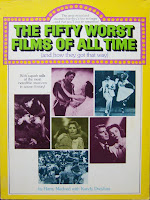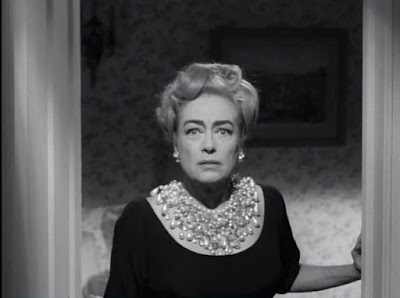My family moved around a lot when I was young, so new cities and new schools were a commonplace part of my upbringing. But commonplace doesn't mean easy. Having to always adapt to new people and new surroundings contributed to my being a very quiet and shy young man who kept to himself and didn't make friends easily.
At home, I retreated into watching movies on TV. But during lunch hours, after school, and on weekends (when I wasn't sitting for hours in a darkened movie house) I haunted the bookstalls at the local library. For as long as I can remember I've loved reading books about Hollywood, filmmaking, and the movie industry. So much so that in every public library in each new city and at every used and new bookstore in each town, my first question of inquiry was always: "Where's your film section?" - and there I'd literally spend hours engrossed in a world which seemed as distant and fantastic as any sci-fi adventure or futuristic fantasy.
My love of reading about film continues to this day, my home bookcases bulging with so many volumes it looks like the film reference section of a research library (I can't really get into e-books - I still like the heft and feel of hardcover).
At the request of a reader of this blog, I thought I'd list a few of my favorite Hollywood/film-related books. Not a comprehensive list by a long shot, and not a list intended to be taken as "recommended reading." Merely a few of the titles that come fondly to mind when asked about film-related books I've enjoyed over the years. (The one restriction I've applied is that I've limited my list exclusively to books I own.)
Since my partner shares my love of exploring the few used bookstores still in existence in the LA area, I'm hoping some of you might perhaps share the names of some of your favorite movie-centric tomes. One never can tell what gems will be unearthed!
The Nashville Chronicles: The Making of Robert Altman’s
Masterpiece by Jan Stuart / 2000 — Since it looks like the once-proposed 10-hour miniseries version of Nashville that ABC-TV was at one time interested in broadcasting will never see the light of day (made up of all the unused footage from Robert Altman's 1975 opus), this impressively comprehensive behind-the-scenes account of the making of one of my favorite films is an invaluable substitute. A vision of personal filmmaking I can only imagine is long gone in this day of the corporate franchise.
Hitchcock -Truffaut by François Truffaut Francois Truffaut / 1966 — I have yet to see the 2015 documentary based on the legendary eight-day interview French director François Truffaut had with Alfred Hitchcock in 1962, but when I read this book in 1970, it was my very first in-depth glimpse into what had heretofore been something we regular folks could only guess at: the job of the director. I know I said none of the books on my list could be called "recommended reading," but if you love film at all, I'd call this book mandatory reading.
Ever, Dirk: The Bogarde Letters Edited by John Coldstream / 2008
For Keeps by Pauline Kael / 1994
Edge of Midnight: The Life of John Schlesinger by William J. Mann / 2005

The Busby Berkeley Book by Tony Thomas / 1973
The Busby Berkeley Book was part of the store's window display, and I had been chattering away to one of my sisters about how, after seeing Ken Russell's The Boy Friend (1971), I had become such a fan of Berkeley's movies. So caught up in the topic, I didn't pay much heed when my mom sent my eldest sister off to check on our parking meter. As it turns, out, my mom actually gave my sister money to go into the bookstore to purchase this book. A book I vocally lusted after, but which seemed too grand and costly a purchase (a whopping $15) to seriously entertain.
As any adolescent is likely to attest; when a parent gives even the slightest sign of knowing what is of importance to their child, it feels like the most extravagantly heartwarming acknowledgment and validation. I've never forgotten the way this terribly sweet gesture made me feel that day, and I forever associate my mom (an avid reader) with instilling in me a love of books.
The Busby Berkeley Book itself?...an exhaustive, photo-crammed, film-by-film look at how Berkeley achieved all those dazzling musical panoramas and kaleidoscopes. They don't make 'em like this anymore.
.
As any adolescent is likely to attest; when a parent gives even the slightest sign of knowing what is of importance to their child, it feels like the most extravagantly heartwarming acknowledgment and validation. I've never forgotten the way this terribly sweet gesture made me feel that day, and I forever associate my mom (an avid reader) with instilling in me a love of books.
The Busby Berkeley Book itself?...an exhaustive, photo-crammed, film-by-film look at how Berkeley achieved all those dazzling musical panoramas and kaleidoscopes. They don't make 'em like this anymore.
.
The Richard Burton Diaries Edited by Chris Williams / 2012
Ken Russell's Films by Ken Hanke / 1984
The Day of the Locust by Nathanael West / 1939
As one who has found in movies a level of comfort and release, I can't help but wonder to what extent I may also use film as a means of escape. I don't have any answers as to it's potential harmfulness (although my instinct leans toward whether films help us to engage in life or encourage us to avoid it) I'm impressed by how artfully Nathanael West turned Hollywood into a state of mind.
The Fifty Worst Films of All Time (And How They Got That Way) by Harry Medved and Randy Dreyfuss / 1978 — One of the great things about coming from a big family is that watching movies on TV together becomes a kind of impromptu MST3K episode. Growing up, my sisters and I all harbored a taste for bad movies and loved riffing on them as we watched, so we actually sought out B-movies and loved cheapo horror programs like Bay Area's KTVU Creature Features (then the only program I knew of to poke fun at movies).
When this book came out, it felt like it could have been a family collaboration. Poking fun at films as diverse as Airport 1975 to Alain Resnais' Last Year at Marienbad, it's more than just easy potshots taken at questionable filmmaking. The book offers a lot of background info on the films in question, and the critiques are more grounded in legitimate structural and contextual gripes than later copycat books could lay claim. A laugh-out-loud funny book with sharp observations.
Easy Riders, Raging Bulls: How the Sex-Drugs-and-Rock 'N’ Roll Generation
Saved Hollywood by Peter Biskind
/ 1998
They Shoot Horses, Don't They? by Horace McCoy / 1935
Honorable Mention:
Pictures at a Revolution- Mark Harris
The Fred
Astaire Ginger Rogers Book- Arlene Croce
Pauline Kael: A Life in the Dark - Brian
Kellow
Jane Fonda: The Private Life of
a Public Woman - Patricia Bosworth
Robert Altman: An Oral Biography - Mitchell
Zuckoff
Roman Polanski - F.X. Feeny
Phallic Frenzy: Ken Russell & His Films - Joseph Lanza
The
Dark Side of Genius: The Life of Alfred Hitchcock - Donald Spoto
Twiggy In Black
& White: An Autobiography - Penelope Dening & Twiggy Lawson
Mommie Dearest- Christina Crawford
THE BARGAIN BIN
Not every film-related book can be a winner. Here are a few I'd put at the bottom of the pile.
Crowning Glory: Reflections of Hollywood's Favorite Confidant by Sydney Guilaroff & Cathy Griffin / 1996
Meaning no disrespect, but if he was seriously trying to carry off this Liberace-esque charade, he should have left out the precious early photo of himself looking like Norma Shearer with his two adopted sons, and most CERTAINLY a later photo with his hunky adopted "grandson" at his side (said grandson being a full-grown man when adopted). When an author lies about the single most glaring fact about his life, the book may be 100% fact, but with the author so determined to nail the door shut on this very obvious closet, I can't trust anything in the book to be reliable.
Raquel: Beyond the Cleavage by Raquel Welch / 2010 — As one of the last of the old-fashioned studio-created sex symbols, one would think Raquel Welch would have a lot to talk about. She's a survivor with a legendary temperament who's worked with some of the biggest names in the business. Unfortunately, Miss Welch (whom I adore) decided that what her fans most needed from her were beauty, diet, and wig-buying tips. She glosses over her questionable film resume (all the more reason I wanted to know more about them) and turns her book into a tedious episode of The View.
The Elephant To Hollywood by Michael Caine 2010
Undiscovered by Debra Winger / 2008
Anyhow, when this memoir came out, I was very excited because I knew Winger to be a straightforward, pull-no-punches type, and I thought she'd use this opportunity to dispel some of the many myths surrounding her tumultuous career.
No such luck. At this point in her life, the talented actress must have been going through some kind of self-exploration journey, for Undiscovered is almost hostile in its refusal to be what anyone picking up a celebrity memoir might expect. Want to know about Terms of Endearment? Tough. She's got several pages of poetry for you. Want to know how the hell she was chosen to replace the fired Raquel Welch in the ill-fated Cannery Row (1982)? Sorry, but prepare to read about her garden.
At the end of it all, you wonder if she just wanted to screw with the publishers (which sounds more like the real Debra Winger than most parts of this book).
Tony Curtis: American Prince by Tony Curtis and Peter Golenbock / 2008 — Perhaps because I was never really a Tony Curtis fan to begin with (the book was a gift), I found a huge ick factor in reading this. Curtis was around 80 when this memoir was published, but it reads like something that would sound puerile coming from a 16-year-old.
To grow older without wisdom or insight is a sad thing, and as Curtis recounts love affairs, sexual flings, and his oddball double-standards when it comes to infidelity (he, a man could sleep with as many co-stars as he wished...the height of insults was to find his wife may have done the same...once!) is to to stare into a pretty but vacuous void. For me, all that came off the page was ego, self-justification, and the pathetic laundry-listing of sexual conquests as though it actually meant something. I had the same reaction when I read Eddie Fisher's 1999 autobiography Been There, Done That. Ick!
So what are your favorite books about Hollywood, celebrity, or the film industry? Any you want to recommend or warn others about? Let me know! In the meantime...see you around the bookstalls!
Copyright © Ken Anderson 2009 - 2016
Copyright © Ken Anderson 2009 - 2016
































































